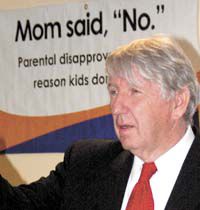| Dan Brown |
On April 16, members of the state and local substance abuse prevention community came together at the Light House in Price, calling area parents to action.
The message delivered by speakers was simple and directed at Carbon County’s parents, “start talking before they start drinking.”
Parents, teens and children were welcomed to the event by Liz Fergerson of Four Corners Community Behavioral Health, who detailed the night’s events before turning the time over to the event’s speakers.
Price Mayor Joe Piccolo presented a call to action for area residents following the surgeon general’s concern for the growing problem of underage drinking.
“We have a great community,” said Piccolo. “But I do believe our community is at risk when it comes to the underage use of tobacco and alcohol. And I further believe that an educated community can handle this situation better than a forceful measure taken by law enforcement.
Many of Piccolo’s comments were aimed at making things better for Carbon County’s youth.
“The kids here deserve better than they are getting and I think we all know that,” said Piccolo. “And we are working within several different programs to make Carbon County a place where the kids have access to safe and exciting recreation.”
Following Piccolo, Carbon School District’s drug free schools coordinator Robert Cox demonstrated the statistics the district has gathered over the past few years.
“Many people in the community say that we have a drug problem at Carbon High School,” said Cox. “The reality of the situation is that we have a drug problem in Carbon County.”
Cox then distributed a data factor definitions within the district.
The table contained opportunities for youth to participate in positive activities and interact with pro-social adults available in the community.
The second portion of the handout gave statistics reported by district students from the sixth, eighth, 10th and 12th grade.
According to one table, 21.6 percent of sixth graders reported drinking by the age of 12 in 2007, a number that increased from 11.5 percent in 2006.
“We have to know our children and who they are hanging out with,” said Cox. “You know there are many students who believe that the laws are set up to allow children to get drugs and use alcohol. We have to show them that there are real consequences for their actions.”
Cox focused that latter part of his presentation on monitoring Carbon County kids.
“When a student’s grades change for the worse, you can bet that something in their life has changed and we as parents need to examine that,” said Cox. “We need to take the time to figure out just what has changed in their environment and see what we can do to assist them.
Representing Mothers Against Drunk Drivers and Parents Empowered was Dan Brown, who detailed the ways parents can effectively communicate with their children concerning alcohol abuse.
“We are here to eliminate this problem, not slow it down” said Brown. “You know children and teens report that parental disapproval is the number one reason they aren’t drinking. You have to let them know what the rules are.”
According to Parentsempowered.org, many Utah youth begin drinking in elementary school and binge drinking is a common activity by the 10th grade. The health and risk assessment is given bi-annually to students in Utah public schools; and shows a disconcerting trend.
“Most parents, however, are unaware of their child’s alcohol use. They think, ‘not my kid.’ In a national survey, 31 percent of kids who said they had been drunk in the past year had parents who believed their children were non-drinkers,” stated the site.
Researchers at major medical schools across the United States used various imaging techniques to measure brain impairment in teen drinkers compared with non-drinking teens.
Dr. Susan Tapert at the University of California in San Diego invited local high school students to have MRI done on the brains. She gave the volunteers, who were all sober at the time, identical thinking tests which appeared on an overhead screen during an MRI.
Teens who admitted to heavy drinking showed much less brain activity than the non-drinkers.
Information at the site demonstrates how underage drinking can have a damaging affect on the still developing brain of a teen.
“Parents really are the biggest factor in this war,” said Brown. “Believe it or not, it is OK to tell your kids who they can and cannot hang out with. You are the parent and you set the rules.”
Brown shared with those at the Lighthouse the story of how his grandchild had been killed by a drunk driver after leaving a school event just like the one he was speaking at.
Brown outlined the main tips parents can use to combat the underage drinking issue.
•Teenagers listen to parents more than anybody else, including friends. Parents should take the time to speak with them.
•Children who feel close to their parents are less likely to drink. Parenting tops peer pressure, according to the site.
•Parents need to set clear rules and expectations about no underage drinking.
•Monitoring children helps prevent underage drinking.

